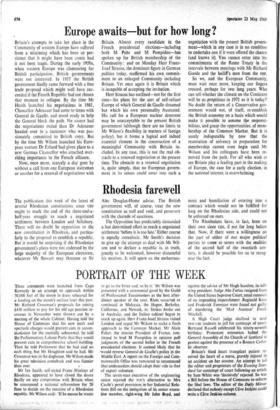Rhodesia farewell
The publication this week of the latest of several Rhodesian constitutions since tan ought to mark the end of the three-and-a- half-year struggle to reach a negotiated settlement between London and Salisbury. There will no doubt be opposition to the new constitution in Rhodesia, and particu- larly to the proposal to establish a republic. But it would be surprising if the Rhodesian government's plans were not endorsed by the large majority of the European electorate, whatever Mr Stewart may threaten or Sir Alec Douglas-Home advise. The -British government will, of course, treat the new constitution as null and void, and persevere with the charade of sanctions.
The Opposition 'has predictably demanded a last determined effort to reach a 'negotiated settlement 'before it is too late.' Either course is equally unrealistic. Mr Smith's decision to give up the attempt to deal with Mr Wil- son and to declare a republic is, in truth, greatly to be welcomed, however distasteful his motives. It will spare us the embarrass- ment and humiliation of entering into a contract which would not be 'fulfilled for long on the Rhodesian side, and could not be enforced on ours.
The Rhodesians have, in fact, beep on their own since um, if not for long before that. Now, if 'there were a willingness on the part of either of our major political parties to come to terms with the realities of the second half of the twentieth cen- tury, it should be possible for us to recog- nise the fact.






































 Previous page
Previous page